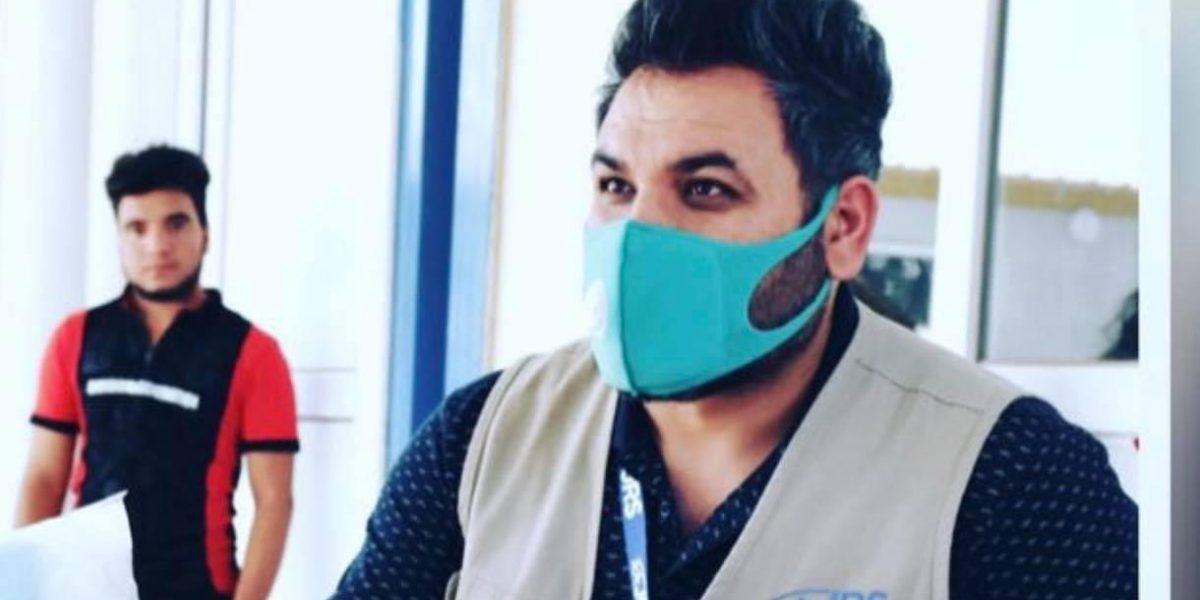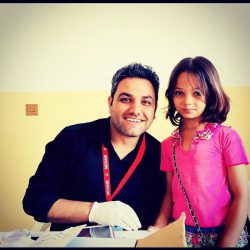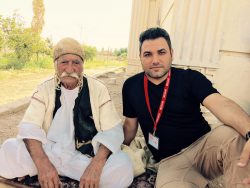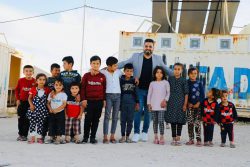Talal Silah: A young Yazidi man makes his community his purpose
28 April 2021|Anthony P. DiFlorio

This story first appeared in JRS INSIDER, a monthly newsletter including stories of impact across JRS global.
Ever since Pope Francis’ visit to Iraq this past March, I’ve been curious about the people who make JRS programs so successful across the country.
Many of the challenges within the country — security, advancing education, protecting religious expression — exist in other parts of the Middle East.
But the harrowing personal journey to become an advocate is what moves me most in this next story.
A few weeks ago, I finally connected with a resilient young man who embodies JRS Advocacy: Talal Silah, Director of Education and Protection at JRS Iraq.

Born in Sinjar, Northern Iraq in the late 1980s, Talal grew up under the dark shadow of Saddam Hussein’s merciless dictatorship.
A Yazidi man, he belongs to one of the oldest religious minorities in the entire region.
He was sent to work at 10 years old — selling water and ice cream under hot summer sun, then carrying construction materials during the winter mornings — before heading to primary school.
“Being forced to work,” he tells me over video chat, “became a motivation to become diligent in my studies, and create sources of income for my family in the future.”
I see a glowing, but tired smile on his face before the pixelated video connection cuts. He spares no detail.
With three brothers and three sisters, his family did everything possible to try and get ahead.
Yet suffering was all but inescapable.
After the US Invasion of Iraq in 2003 and fall of Saddam’s regime, his family began a new chapter, but tragedy compounded shortly after.
Talal’s father, a driver with a local municipality, fell ill with cancer and died. His older brother took his own life while Talal was preparing for his final exams in high school.
He persisted and pushed his studies to the university level — first completing schooling in India before pursuing a second degree in Kurdistan, Northern Iraq.
He began to live his dream as a working journalist at the center of media in Iraq.
Then hell arrived again in August 2014.
The Islamic State (IS) laid waste to his hometown, Sinjar, and marked the beginning of a genocide campaign aimed at eradicating all non-Islamic influences in the region.
Many of his friends and relatives were captured or killed.
“My family immediately became displaced persons in the Kurdish camps,” he says. “Imagine, 13 members in one school room for five months.”
“That’s when I knew I needed to do something and really help my people,” he adds.
Armed with his education, his media training, and the fiery drive to protect his own people, Talal got to work.
He began to organize for groups that resettled Yazidi refugees across Europe. In 2016, he became director of media and human rights at YAZDA, a global protection group founded in the aftermath of the genocide.
“We were using media for good,” he says, describing how they shared statements to motivate forgotten families and updates about human rights abuses across Northern Iraq and the region.
In July 2019, Talal came aboard JRS Iraq, bringing his deep relationships with Yazidi community leaders to advance justice, education, and healing to thousands.
Today, he oversees JRS Youth and Adult Skills Education programs that lift up nearly 3,000 IDP families and 17,000 total individuals.
Kindergarten courses under the Kurdish government serve 90% IDPs, while the remaining are from the Yazidi host community.
 For adults, skills courses in computer basics, English, sewing, and barbering offer a second chance to his Yazidi brothers and sisters.
For adults, skills courses in computer basics, English, sewing, and barbering offer a second chance to his Yazidi brothers and sisters.
In addition to providing home visits, educational support, and livelihood training, JRS staff provide psychosocial care to the IDPs and refugees in the area, many of whom have serious mental health issues.
As we wind down, I ask him about the future — his family’s future.
“Because of the unknown, as a Yazidi man,” he says, “it’s very difficult to even know what you want in the future. You just want to be safe.
Personally, I hope to bring the case to the International Criminal Court, to advocate for those people, and to return them, above all, in a dignified way to their homes.”



